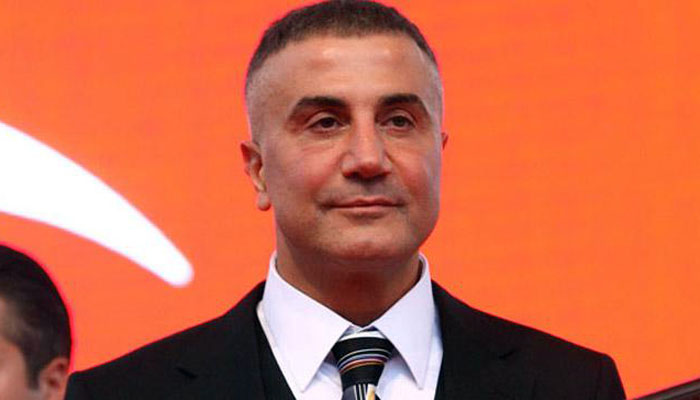Sevgi Akarçeşme
On Sunday June 13, a significant number of Twitter users following Turkey were worried about the whereabouts and well-being of Sedat Peker, a mobster who has become a social media phenomenon in the last couple of months with his YouTube videos watched by millions.
Peker, a convicted mafia boss and once a staunch supporter of President Recep Tayyip Erdoğan, has been sending shock waves across Turkey from abroad due to his revelations about mafia, state and business world relations in the country. Some of his confessions were open secrets, but because he speaks as an insider he is more convincing than the media and the opposition. People tune in to YouTube awaiting the release of his new videos every Sunday morning.
Peker’s claims are wide-ranging. He alleges that former Prime Minister Binali Yıldırım’s son is involved in international drug trafficking; that the government smuggled arms to jihadist groups in Syria through SADAT, a paramilitary organization established by a former adviser to Erdoğan, by using Peker’s humanitarian aid trucks as a proxy; that Interior Minister Süleyman Soylu and his inner circle are laughing all the way to the bank by blackmailing people with bogus charges of Gülen movement links; that former shady police chief and interior minister Mehmet Ağar unlawfully seized the Bodrum Marina, which belonged to Azeri mogul Mübariz Mansimov; that Ağar’s son Tolga, a deputy from Erdoğan’s party, raped and killed a reporter; and much more.
Before Peker’s relationship with Erdoğan went sour for a reason that is not yet clear, he did not mind creating a climate of fear especially in the wake of a July 15, 2016 coup attempt. Peker became more and more visible as the rule of law in Turkey became more and more invisible. He openly threatened academics who signed a petition calling for peace with the outlawed Kurdistan Workers’ Party (PKK). He vowed in one of his speeches to shower in the blood of those academics. It seems that Peker was discarded by the government after an older-generation mobster, Alaattin Çakıcı, was released from prison last year. All of a sudden, Peker decided to “study abroad in the Balkans” and turned against the government.
Starting in May, Peker began to post hour-long videos on YouTube, first targeting Soylu and Ağar. He was much more articulate and sophisticated than one would expect from a mafia boss. He quoted from books, religion and history while revealing the crimes that top government officials had committed. He didn’t try to hide that he was in cahoots with the government. Indeed, in one of his latest videos he said, “We are a family in crime,” in reference to his relationship with the government. Many interpreted his videos as the tip of the iceberg and a bargaining chip with Erdoğan. However, when Erdoğan defended his corrupt minister and all those he implicated in the videos, Peker began to mention “Brother Tayyip” and settling accounts with him. When Peker said he’d delay his video about Erdoğan until after the Biden meeting on June 14 to rule out allegations of being used by the CIA as a “spy,” many were disappointed. This psyche of Turks perceiving him almost like a savior from the oppressive rule of Erdoğan is very telling. In the absence of a free media and an assertive and effective opposition, people are hoping for a change triggered by the mafia boss. As a result, when Peker disappeared for 12 hours on Sunday without a tweet and people close to him expressed concern because he was taken into custody in the United Arab Emirates, the anxiety peaked. Peker previously implied that several men had been sent to execute him or abduct him to Turkey.
There was a sense of relief among the opponents of the regime when Peker finally tweeted in the wee hours of Monday saying the authorities wanted to talk to him amid a high volume of claims. He said there was also concern about his security, giving credence to rumors that the Turkish government had outsourced his execution to foreign mafia groups. After all, the stakes are high for Erdoğan, although not a single official has been removed after the very specific revelations by Peker.
While Peker is now seen as the arch enemy of Erdoğan, he is not a product of this era. In his own words, the clandestine wing of the Turkish state used him in the 1990s in extrajudicial affairs. Peker revealed in one of his videos that he sent his brother to kill Turkish Cypriot journalist Kutlu Adalı in the ’90s. Moreover, he shed light on the assassination of Turkish journalist Uğur Mumcu in 1993 after he began to investigate relations between the state and the outlawed PKK. He accused Ağar of being behind the killing of Mumcu in a car bomb attack in the dark decade of state-mafia relations in the 1990s.
It is now obvious that Turkey has been going through an even darker period as the state itself has turned into a mafia. It is not an overstatement to claim that Erdoğan and his inner circle are a threat to the nation itself with this criminal network. I call this rule “mafiaocracy.”
Given the miserable condition of Turkey’s weak and fragmented opposition and the almost fully controlled media environment, it is up to a mobster to undermine this criminal network as an insider. It’s no wonder Wikipedia describes him as a whistleblower and that he makes headlines beyond Turkey.
Let’s keep our fingers crossed and keep this mobster in our prayers until he reveals a big chunk of the dirty secrets of Erdoğan and the Turkish state, which has been acting increasingly like a mafia since its establishment.
Sevgi Akarçeşme is the former editor in chief of Today’s Zaman and Turkish Minute.

